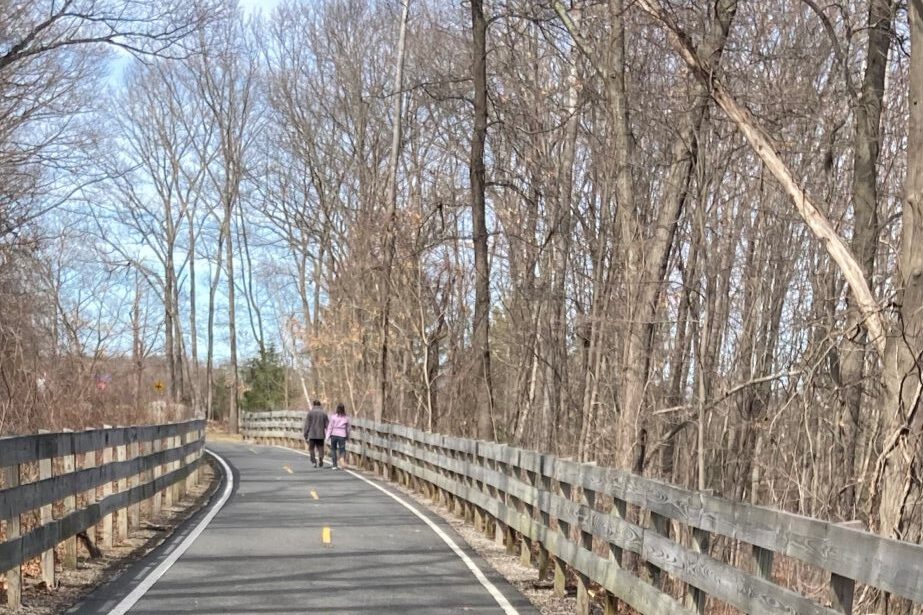It would seem from this fact, that man is naturally a wild animal, and that when taken from the woods, he is never happy in his natural state, ’till he returns to them again.
-Benjamin Rush
The past few days have been warm, for February, with temps up into the low sixties. Winds in the low teens have kept it from being shirtsleeve weather, but, still, it has been pleasant. I’ve had to bring out Waldo’s water bottles, so he can get a refreshing drink before we finish walking. When it’s cold, I don’t bring them, because he’s not thirsty and he refuses to drink. Today, he is and he doesn’t. I start out a little chilled in my light jacket, but before we finish, I’ve worked up a sweat and unzip the thing. It’s that kind of ‘tween day when it pays to dress in layers.
Most of nature is still hibernating, waiting for the longer days of spring. There are a few plants with swollen buds, but none that have started to show tiny nascent leaves. The deciduous trees are still in a state of deep slumber, with their spindly bones reaching skyward. The English ivy on the dead oak is still green, but the garlic mustard has disappeared — I don’t know why. There is evidence of many other kinds of vines — thick, seemingly dead, stems wind around the tree-trunks next to the trail, but there is no green on them. That won’t come until somewhat later.
It occurs to me that the forest is an entire community of plants — trees, vines, bushes, mosses, ferns, grasses and so on, that, when not in a winter’s sleep, communicate with each other, through the air and through their roots. They even share nutrients among themselves. Somehow, and science is only beginning to understand the details, they coexist and help one another. Generally speaking, although there are exceptions, they are friendly to each other.
People, out here in the woods, are also friendly to each other – for the most part. Usually, the people Waldo and I meet on the trail are personable and eager to interact. Waldo, of course, is eager to meet nearly everyone and is seldom rejected. If I offer a, “Hello. How are you?” most are ready with a “Good. How are you?”, in response. There are some who don’t want to be disturbed and just ignore my overtures, but they are few in number. If the mood strikes me and I stop and attempt to enter into short conversation, about dogs, or the weather, or the trees, more often than not, people will readily stop and exchange a few amicable words. It’s not quite so friendly in town, especially in big cities, but out here, things are very genial.
In cities, like Los Angeles or New York, people aren’t nearly as easygoing. If you pass by someone on the sidewalk, turn and say, “Hello,” if you aren’t completely ignored, you’d likely see them move away from you, as if to avoid an unpleasant interaction. I can understand that, because, in the megapolises of the world, people are more focused on where they aren’t – where they are bound and what they have yet to do. They’re on a mission. Stopping and exchanging pleasantries interrupts their progress. I suppose, too, there might be a sense of alarm in this kind of interaction as it is more likely that you’ll meet people who are out to take advantage of you in one way or another. People out here in the woods, though, are here, mostly, to get away from all that and enjoy, simply, a nice walk in nature. They feel less threatened and more eager, not to interrupt, but to share their good times.
There are differences, too, in what part of the world you are strolling through town. On a trip to Melbourne, Australia, my father and I met people who, in response to a simple greeting, would turn, face us and say, “Hello,” pleasantly, then continue on their way. Auckland, New Zealand, was special. There, people consistently stopped, faced us, said, “Hello,” and then entered into interesting conversation, eager to interact.
Many of those who Waldo and I meet on the rail-trail are like those my father and I met in New Zealand. Maybe, it’s just that, on the trail, people are relaxed and have no pressing agenda nudging them along, causing them to avoid any interaction that might deviate them from their purpose. Maybe, people in New Zealand are more laid back and spend more time smelling the roses than those in many of the bigger cities of the world. In the same way, people on the rail-trail are relaxed and here, not as a means to some important end just down the way, but solely to take some time out to just be where they are. Maybe, people on the rail-trail, and New Zealand, interact socially simply because they have taken time off from their busy lives to go for a walk. That respite provides enough space for all kinds of interactions they usually don’t have time for.
I wonder if there are differences in how plants interact in the forests of the world. There certainly are places that have a healthier, happier feel to them. I think the trees around Waldo and I have a stressed, contented feel to them. Stressed because they are so close to the poisons and intrusions of the nearby city, but contented because they have reached some kind of equilibrium that allows them to grow and prolifically refoliate every spring – year after year.
Whatever the case, Waldo and I, and those we pass, are happy to be here.



